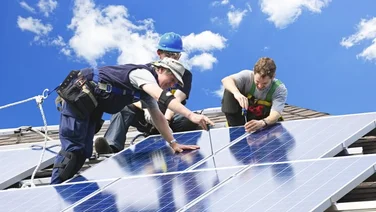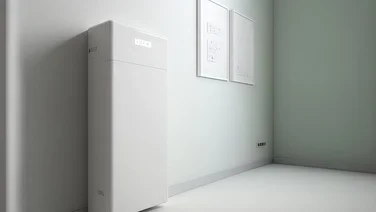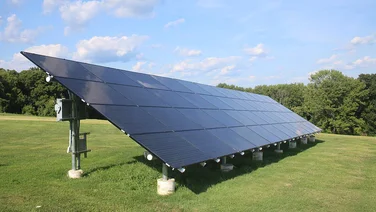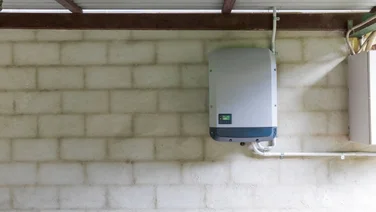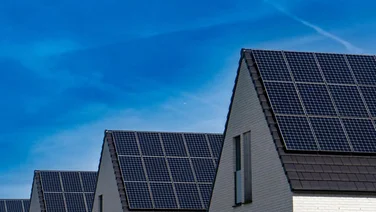- Solar panels are usually included in your home insurance policy
- Warranties typically protect your panels for 25 years
- Fill in the form above to receive solar panel quotes from local experts

Solar energy is great for helping you cut your energy bills and carbon footprint – but as there are significant upfront costs for installation, it’s important to ensure that your investment is protected by a good maintenance programme and adequate insurance cover is in place.
After all, there’s no point buying cutting-edge green technology if it won’t last its full 25-year lifetime – and as we all know, things happens. Trees fall, birds target machines, and sometimes, thieves strike. Check out our guide on what to do if you have broken solar panels to prepare yourself against these potential dangers.
In the meantime, solar panel insurance can protect you against the consequences of all physical and technological issues with your shiny new machines, and give you precious peace of mind.
Insurance for your solar system also ensures that you won’t be shelling out thousands to replace your solar panels if they’re damaged beyond repair.
If you’re feeling encouraged to get some panels of your own, complete this form to receive bespoke quotes from local experts.
Where do you want to install solar panels?
Get startedWhat is solar panel insurance?
Solar panel insurance is a policy that protects your solar panel system from a range of occurrences, which can help you keep solar panel costs to a minimum.
You’ll usually be covered for everything from natural disasters to theft, though probably not for accidental damage – so keep your roof gymnastics to a minimum. With this in mind, it’s still really important to look after your solar panels after installation.
The addition of solar panels may increase the cost of your home insurance, but not by much and trust us, it’s so worth insuring them.
You don’t want anything to happen to your shiny new source of green energy after all – and with solar panel insurance, you don’t have to worry even if the worst does happen.
This is especially crucial considering the initial price of panels. For an average family of three, a network of solar panels typically costs between £5,000 and £8,000.
Want to learn more about how much solar panels could cost you? Check out our page on Solar Panel Costs.
Though you’ll soon start saving money each month on your energy bills, you’ll want to insure such a valuable addition to your home.
What is covered by solar panel insurance?
Solar panel insurance covers a range of situations that if they happen, you’ll be grateful you got cover against.
The first is damage from natural disasters, which is everything from extreme weather to trees falling onto your roof. Most insurance policies cover this and it’s an essential thing to look out for – expect the cost of insurance to rise in areas where natural disasters are more likely.
Theft is another thing typically covered by solar panel insurance. Unfortunately, there’s always the risk that someone is going to want to steal your solar panel system. You might be away on holiday and find yourself returning to an empty roof, which would be devastating without insurance.
Then there’s a loss of income due to power generation outages. If solar panels provide electricity that’s essential for your business, you could be liable if they stop working and cause you to lose income.
Finally, there’s liability for injuries or damage to your roof caused by your solar panels, as unlikely as this might be. Solar panels are usually installed very securely to your roof by the professionals attaching them, but there’s still a chance they could damage your roof or cause injury to you if they fall off.
What is not covered by solar panel insurance?
Solar panel insurance doesn’t cover everything, so it’s important to get an idea of what you might not be insured against if it happens.
Your policy won’t cover normal wear and tear, for example, because this is expected to happen throughout a solar system’s lifespan. Solar panels generally last 25 years or more, so you’ll be waiting a long time for the wear and tear to occur.
Manufacturing defects are another aspect usually not covered by insurance, unfortunately. As much as it’d be nice to be covered by something out of your control, solar panels that arrive with defects won’t be insured. However, you’ll be covered by the manufacturer’s warranty, which is different to insurance.
Insurance generally won’t cover improper installation either, which means it’s so important to ensure you pick a trusted professional to install your solar panels. It might be tempting to install solar panels yourself, but it’s always better to use a professional.
It’s also unlikely that accidental damage is covered too, which is another reason not to attempt to repair or inspect solar panels yourself. If you cause accidental damage to your solar system yourself, you likely won’t be liable.
Where do you want to install solar panels?
Get startedWhat types of solar panels are covered?
Your home insurance package will usually cover all types of rooftop panels, from standard monocrystalline or polycrystalline photovoltaic systems, through to more modern flexible panels.
If you’d like to find the best flexible solar panels in the UK, read our dedicated guide.
Major insurers including HomeProtect and LV= will see the panels as a standard addition to your home, and will class them as permanent fixtures – just like your walls and ceilings.
All you need to do is notify them about the new 40-pound blocks of silicon you’ve secured to your roof.
Are solar panels covered by home insurance?
Your buildings insurance policy will usually include the option to have solar panels, because they’re part of the fittings and fixtures of your home – in most cases, they’re literally fixed to your roof.
Contact your insurer and ask whether your policy includes a photovoltaic system, preferably before you have the panels installed.
Even if you’re absolutely sure you’ll be covered, you still need to notify your insurer. After all, attaching thousands of pounds worth of panels to your roof constitutes a major change to your home.
Solar inverter insurance
All parts of your panels will be covered under your home insurance policy, so you don’t need solar inverter insurance.
This is a positive, since any policy for the inverter would be pricey. It’s one of the most important parts of your solar network, turning direct current electricity into alternating current, which can then be used to power your home.
They typically have a shorter lifespan than solar PV panels, though well-made models will last up to 15 years.
Solar installation insurance
You also don’t need solar installation insurance.
Make sure you have a home insurance policy that covers your new panels, and solar warranties which insure you against equipment or performance failure, and you’ll be set.
You won’t need to worry about the installation going south, and you can sit back and watch as your energy bills go down.
How much does solar panel insurance cost?
Solar panels are generally included in your home insurance policy, meaning you won’t pay anything extra if you choose to save money (and the planet) by investing in a solar array.
The average annual cost of buildings insurance is £119.22, according to the AA’s British Insurance Premium Index, so make sure your provider is charging you a fair price.
Some companies will charge a little extra for solar panel insurance. The payment is generally negligible, but if it’s sizable, you could always switch to a more accepting insurer.
How long is the warranty on solar panels?
There are two warranties when it comes to solar panels: equipment, and performance.
The equipment warranty will cover you for physical failures, and generally lasts between 10 and 12 years.
This will protect you against defects, the panels failing completely, and environmental issues causing a halt in energy production. Getting the warranty means that if your panels break, you won’t suffer.
The performance warranty insures you against your solar panels falling below their high standards when it comes to producing electricity.
Your policy will usually guarantee you at least 90% production after 10 years, and 80% after 25 years.
“The average degradation rate of solar panels still allows reasonable performance after 25 years.”
– National Renewable Energy Laboratory
Panels have a median degradation rate of 0.5% per year, according to a study by the US government-funded National Renewable Energy Laboratory.
This means your panels have a high likelihood of outliving their warranty – as long as you get high quality models.
If you’d like to receive specialist quotes for top-notch solar panels, just fill in this form.
Most solar panel warranties are transferable, but check ahead of time to make sure the company you’ve chosen will allow you to pass on your warranty.
If you can transfer the warranty, you’ll be able to charge more for your property. After all, solar panels can save your home’s new owners a lot of money.
And if you’re buying a home with solar panels, you’ll absolutely want to know that you can use them after you move in. If you can, your beautiful new home will look even better.
Summary
- Solar panel insurance typically covers natural disasters and theft, but not accidental damage.
- Manufacturer defects are covered by the manufacturer’s warranty instead
- Expect to pay around £119 per year for buildings insurance to cover your solar system.
- Most policies guarantee you at least 90% electricity production after 10 years, and 80% after 25 years.
- Just fill in this form to receive solar panel quotes without worrying about additional costs.


